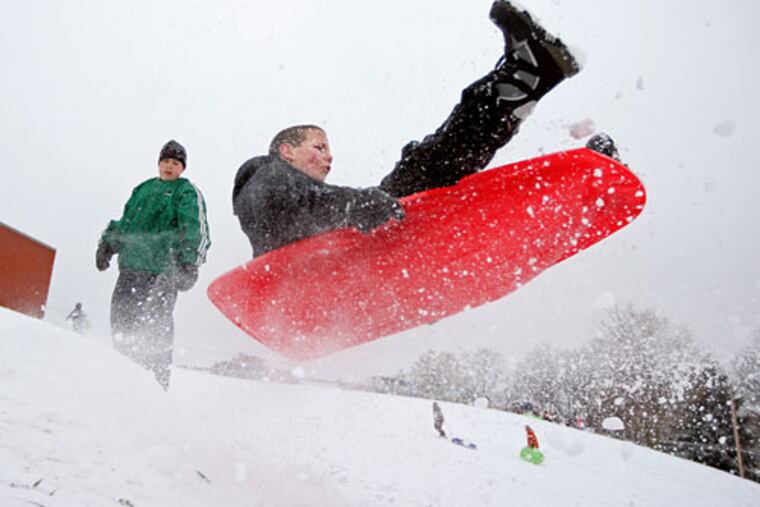No more snow days for some Pa. kids? Some parents say: Not so fast.
“I can’t see every employer being flexible with this kind of thing,” said Starr. “I do think it’s an interesting concept, but the execution won’t work for everyone.”

When Gov. Tom Wolf signed a bill into law permitting Pennsylvania schools to allow students to work from home when the weather is bad, some officials cheered.
Figuring out how to make up snow days in packed school calendars will be a thing of the past, proponents said. Young people are technology natives, and allowing them to embrace digital devices to produce meaningful work when they can’t get to school is a good solution, others said.
Marisa Starr was not cheering about the “flexible instruction days.” Starr, who lives in Havertown, would work from home if her children couldn’t go to school because of a snow day, and so would her husband. Her seventh grader would probably fare fine, but her second grader, who needs special education services, would require one-on-one attention to complete schoolwork.
“I can’t see every employer being flexible with this kind of thing,” said Starr, who works in marketing. “I do think it’s an interesting concept, but the execution won’t work for everyone.”
And what about the value of just letting children have that rare gift of a weekday filled with playing in the snow or sleeping late?
“Nothing as a kid beat that feeling of waking up and finding out there was no school,” said Emily Litchendorf, who lives in Northeast Philadelphia and has one child in a city charter school. “It was pure joy, and there’s something to be said about giving that to kids. I would hate to totally deny that possibility to the next generations."
Under the new law, schools could have up to five such flexible instruction days per year, and those days would count toward the 180 days of instruction the state requires.
The law does not mean districts must use the so-called cyber days; it merely permits them to, and it requires that schools make arrangements for students and professional staff who lack wireless access or adequate technology to make them work.
To that end, it seems unlikely that districts like Philadelphia — where the vast majority of the 205,000 students in traditional public and charter schools live below the poverty line — are likely to embrace the concept.
“We’re aware of this legislation at the School District of Philadelphia, and would need to look into it to see if this made sense for the district," said spokesperson Megan Lello in a statement. "There are certain limitations, like students’ access to technology at home, that we’d need to consider.”
Some schools have already made the leap to flexible instruction days instead of canceling school when the weather is bad. But others have held off, citing concerns about technology or the logistics of having teachers prepare plans and ensure that children are actually working.
Janet McHale, parent of a junior at Roxborough High, wonders about how children would be supervised under such a plan.
“My son could stay home on a snow day, but could I trust him to get his work done if I had to go into work?” McHale said.
McHale also wonders what the shift would mean for teachers like her husband, who works at a Philadelphia School District elementary school. Teachers already prepare emergency lesson plans for their own unplanned absences. Would this mean they’d have to prepare more just-in-case lessons?
But mostly, she’s thinking about access, McHale said.
“I know at Roxborough, we don’t have enough laptops to go home with kids, and not everyone has devices at home,” she said. “There’s just too many variables to make it feasible.”